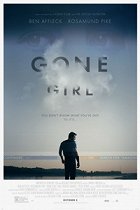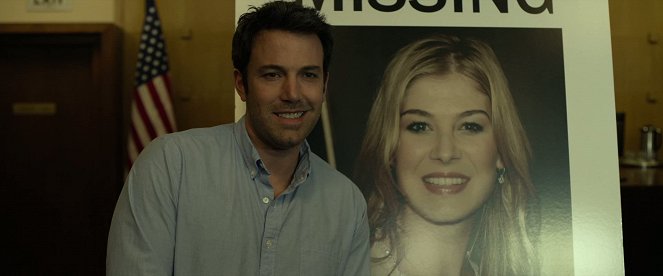Directed by:
David FincherScreenplay:
Gillian FlynnCinematography:
Jeff CronenwethCast:
Ben Affleck, Rosamund Pike, Neil Patrick Harris, Tyler Perry, Carrie Coon, Kim Dickens, Patrick Fugit, David Clennon, Lisa Banes, Missi Pyle, Emily Ratajkowski (more)VOD (2)
Plots(1)
GONE GIRL unearths the secrets at the heart of a modern marriage. On the occasion of his fifth wedding anniversary, Nick Dunne (Ben Affleck) reports that his beautiful wife, Amy (Rosamund Pike), has gone missing. Under pressure from the police and a growing media frenzy, Nick's portrait of a blissful union begins to crumble. Soon his lies, deceits and strange behavior have everyone asking the same dark question: Did Nick Dunne kill his wife? (20th Century Fox)
(more)Videos (2)
Reviews (17)
Gone Girl is a really good atmospheric drama, the kind probably only David Fincher can make. But that’s my problem – whenever I see Fincher and a thriller, I expect something in the vein of Seven. But as opposed to this flick, everything about Seven was perfect. In this case, the movie is close to perfect, which is also why I was originally going to give it a five-star review. But as time went on, I decided to take one star off because there were things in the movie that messed up the perfection. Take for instance Neil Patrick Harris. His character was good, but I’d never cast him into a serious thriller like this. He simply doesn’t belong into movies like that, no matter how hard he tries. You may have noticed that nobody even mentions him here. By contrast, Rosamund Pike puts in a performance that will be really hard to ever to surpass for her. I hadn’t seen such a good performance in a long time and I will not forget it any time soon, if ever. Despite her perfect performance, you still have Ben Affleck, about whom I really don’t know what to think. I definitely wouldn’t say he’s stiff, which is what a lot of people here are saying, I simply didn’t know where to put him. It seemed to me he had no opinions of his own and I still feel the same way. Well, and these three actors portray probably the three most important characters in the movie. And that’s where it all starts from and also what it lives and dies with. As regards the story, it’s absolutely clear to me why Fincher had picked it. The same way it was clear to me why he’d picked the ‘Millennium Trilogy’. It’s obvious that he likes stories like these. He simply loves the unexpected twists. Let me just add that this movie didn’t get five stars because the ending was cut off unnecessarily fast. I would have expected some kind of conclusion that would knock me off my feet and that I could keep thinking about without having to get back to the movie as a whole. Simply some knock-out ending. Something similar to what you get in Shutter Island. Unfortunately, that didn’t happen, hence the four-star review. At the same time, I think that it is one of the best movies Fincher has ever made. If he just went on making movies like this, I wouldn’t mind at all.
()
This seemingly careless directorial style, in which every scene has its place, is slowly starting to bother me. Because it has never been as impersonal in David Fincher's interpretation as it is here. And if a dramatic thriller, whose essence lies in relationships, lacks even a hint of chemistry or tangible emotions between Nick and Amy, that's a disappointment. And if they also lack it in those moments when they are supposed to be a couple in love or overflowing with hatred, I realize that I am not getting nearly as much as I would like – and probably should, considering the topic. The complicated journey of the lost girl and the people around her is significantly less sophisticated or surprising than it promises most of the time. Relationships may be hard work and a science – but they're definitely not like this.
()
So this is the drama that made everyone pee their pants in bliss? It's impersonal, cold, both of them deserve to be slapped. I liked the character of the detective and the sister of the accused the best – there seemed to be some character to them. But otherwise it's like walking through a fog. It might feel nice at first, coming out of the warmth of your home, but as time goes on you realize you can't actually see anything and you feel the same thing all the time. No twist. Nothing to delight you. It's a film about how manipulation, callousness, and emotional apathy win out. Is that a reflection of the US? Europe? The world? When I think about it that way, it's disgusting. But that's about the only emotion the film evoked in me. Otherwise, nothing. A blank void. In the fog. But it's shot with precision, no question.
()
Like Paul Thomas Anderson, David Fincher is moving toward an increasingly subdued and austere form of perfection in his directing. After the first part of their respective filmographies, which was characterised by ostentatious formal bombast culminating, in Fincher’s case, in Panic Room with abundant playing with flying camerawork in flawless reality-defying approaches, greater efficiency and modesty are increasingly becoming hallmarks of their later films. That doesn’t mean that Fincher and Anderson have become some sort of ascetics, but only that their mastery is reflected in the fact that they do not in any way attract attention to themselves. We could almost mention the return of studio style, where the form also served to maximally draw viewers into the story and did not have to draw attention to itself, except this time it’s not a matter of following certain conventional rules, but expressing flawless familiarisation with the craft and maximally well-though-out composition of every shot so that it serves the work as a whole. Gone Girl is Fincher’s riveting masterclass on outwitting viewers, where at the same time we are astonished not only by the narrative (typically about characters who deceive those around them and inventively work with their own image), but also by how seemingly easily and subtly the film guides us and keeps us chained to the screen and holding our breath throughout its runtime.
()
When an author adapts his own (so complex) work for the silver screen, it rarely bodes well because there is too much personal involvement. This doesn’t apply to Flynn, who wasn’t afraid of cutting up and changing her "mirror holding, not-so-much-crime-thriller, satirical, cynical bestseller about relationships" to suit the needs of another medium. So she got rid of everything not directly related to the central storyline. Due to this there is drastically less about those two (and so the main snag with the original book, that these two are puppets who behave according to the momentary needs of the story and that they aren’t living characters, becomes much more apparent) and more about the investigation storyline and the influence of the media on public opinion. And so the movie did include Nick’s unfulfilled ambitions as a writer and Amy’s magazine quizzes in everyday practice. Even the diary entries are edited to the bare minimum; it’s simply whittled down to a stump. And as much as this approach didn’t work in the book, the better it works on the movie screen; especially Fincher’s so apt, coolly depersonalized concept which is taken a level higher by the disquieting hypnotic background music from the Reznor/Ross duo. In any case, the most important parts of the book remained. The evolution of the Nick/Amy relationship is cleverly written, like the best horoscopes. I mean in a way that any couple in a long term relationship can recognize themselves in some respect (I’m talking about the first half here). And in this situation you might take it personally, because this creates the impression that "this could happen to you too". If it isn’t happening already...
()



Ads